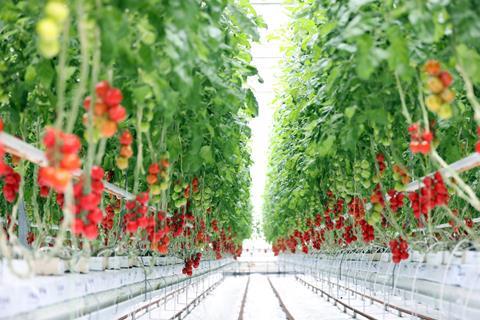Glasshouse grower groups warn of dire consequences if horticulture isn’t given an exemption to upcoming increases
There could be widespread business failures and higher food prices as a result of a massive 94 per cent hike in electricity network charges set to take effect in April 2026, the UK’s controlled environment horticulture sector has warned.

Represenatives of the British Tomato Growers’ Association (BTGA) and the Cucumber and Pepper Growers’ Association (CPGA) say that the sector’s exclusion from the Energy Intensive Industries (EII) exemption scheme is causing a huge problem. While including protected horticulture in the EII scheme would offer considerable relief, they say that even with a 90 per cent discount, ongoing increases in energy costs across the board remain financially problematic for many businesses.
UK energy costs are the highest in Europe and further increases risk making British horticulture uncompetitive compared to growers in countries like the Netherlands and Belgium, the organisations say.
The EII exemption was introduced to help offset this disadvantage, as UK industrial electricity prices remain significantly higher—£56/MWh versus £34–£38/MWh in France, Germany and the Netherlands.
For some large individual glasshouse businesses, the planned standing charge hike of 94 per cent could add almost £1 million to operating costs, the groups warn.
“This is not just a business challenge, it’s an existential crisis,” said Simon Conway, chair of the BTGA. “After weathering the recent energy crisis, this non-commodity network charge increase threatens the viability of glasshouse growers, unless they can pass the costs downstream, which in turn could drive further food inflation in 2026.”
The grower groups argue that the sector’s exclusion from EII relief stems from a technicality, and industry leaders are urging the government to recognise the sector’s true energy profile.
If that doesn’t happen, they warn that there will be an increased cost to food production that will impact consumers, compounding existing struggles with the cost-of-living crisis.
Unviable costs will reduce the competitiveness of UK grower businesses, likely leading to business failures and reduced future investment in more production and innovation. Food resilience would also be undermined, with domestic growing capacity reducing and an increasing reliance on imports.
The BTGA and CPGA added: “We’re calling for a common-sense fix – at the very least update the eligibility rules to include CEA horticulture in the EII exemption scheme to reflect our energy-intensive reality. Even with support, energy costs continue to rise relentlessly, which places unprecedented pressure on growers. Without urgent action, UK food production is at risk and consumers will continue to feel the impact at the tills.”



